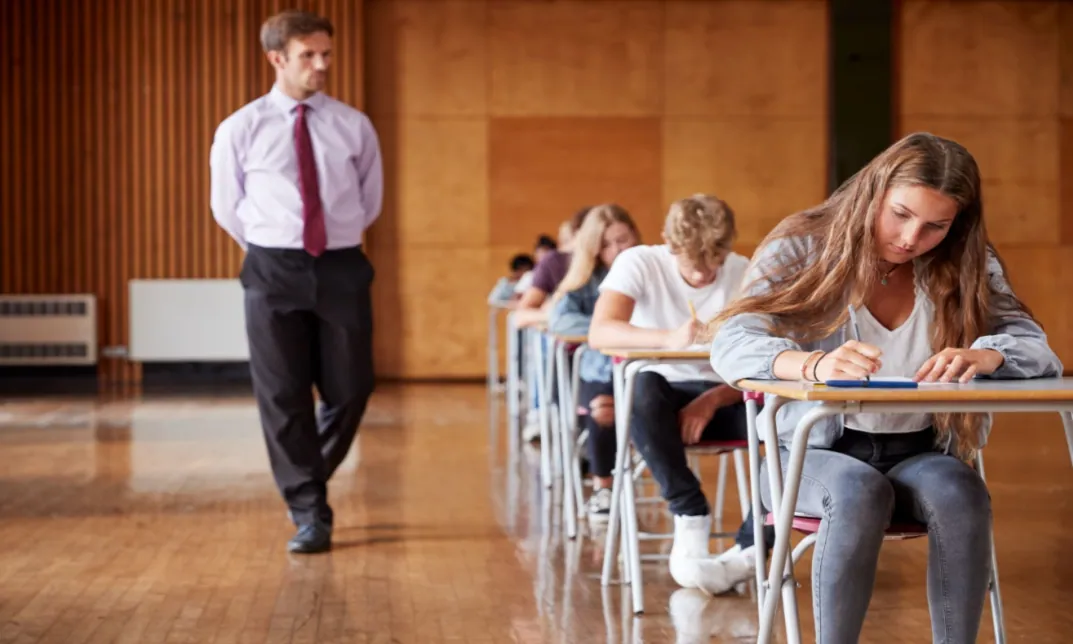Every year, millions of students across the UK sit their exams. Exam days can feel stressful for everyone, and many things must go right for students to get a fair chance. In 2023–24, there were over 5.7 million GCSE entries and more than 760,000 A-level entries, and numbers rose again in 2025, according to Ofqual. It shows just how large exam season has become and how much pressure sits on schools. This is where invigilators step in. So, what do invigilators do?
Calm settles over the room because of the invigilators. Papers stay safe. Rules stay clear. And the day follows a steady structure instead of slipping into chaos. With bigger halls, more devices to watch for and new rules around smart technology, their role matters more every year.
This guide takes you through the job in a clear, friendly way. Each part is easy to follow, with short sections and simple ideas that help anyone understand what invigilators do and why the role is so important.
What Is an Invigilator?
An invigilator is an adult who watches over an exam room. Their job is to make sure the exam runs correctly. They follow the national rules called JCQ ICE, which all schools use so every student is treated fairly.
Invigilators protect both the students and the exam papers. They keep things fair, stop cheating quickly, give clear instructions, and stay calm when the room feels tense. When students trust the adults in charge, they can focus better and feel less stressed. They do not teach or explain exam questions. Their role is to guide the process and keep everything running smoothly. Invigilators matter because they help the whole exam system stay fair.
If you want to learn how to step into this role, the blog How Do I Become an Exam Invigilator? gives a clear, easy guide to getting started.
Why Invigilators Matter in UK Exams
Exam season in the UK is big. Millions of papers are sat each year, and schools can’t run them without trained adults who know the job. Many schools bring in dozens of invigilators each summer because exams overlap and some students need their own supervised rooms.
Invigilators help with:
- fairness
- safety
- calmness
- organisation
- protecting exam papers
- supporting stressed students
Many students feel nervous. When they walk into the room and see kind, steady invigilators, they feel safer. They feel less alone. They know someone is watching over the room in a positive way. A recent TES survey showed that students list “calm invigilators” as one of the top things that reduce stress in exams.
Work Invigilators Do Before the Exam Starts

Invigilators come in early. They do not rush. They take their time to prepare the room. A smooth exam begins long before students enter the room. Most invigilators arrive 45–60 minutes before the start because small mistakes made at the beginning often cause big problems later.
They check the exam room
Invigilators look at:
- spacing between desks
- clear walkways
- the clock on the wall
- signs that say “Exam in Progress”
- emergency exits
- windows and lighting
- chairs and desks
They remove anything that could distract students. This includes posters with subject content, displays with writing, or anything that might give an unfair hint.
They collect exam papers
The exam papers sit in a locked cupboard. Only trained staff can collect them. Invigilators take the papers and keep them safe. They stay with the papers until the exact start time. This is very important. Ofqual treats paper security seriously because even one leaked paper can affect thousands of students nationwide.
They check the seating plan
Every student has a seat. The plan must match the register. Students must sit in the right spot so no one gets the wrong paper. Large exam halls sometimes hold 150–300 students, so seating plans avoid confusion and keep things fair.
They talk with the exams officer
Invigilators check special needs, extra time, readers, scribes, and any support. They also check if students need separate rooms. More than 20% of GCSE students now qualify for some form of access arrangement, according to JCQ, so accurate communication matters.
Bringing Students Into the Room
When the time comes, invigilators let students enter the room. They stay calm, and students walk in quietly, find their seats, and get settled. Bags, phones, smartwatches and headphones are placed in the correct spot. No devices stay with students. Smartwatches became a big problem in 2024, so the rules on wearable tech are now much stricter.
Before the exam starts, an invigilator reads an official message. Every school in the UK uses the same announcement. It explains the rules, the allowed materials, the timing, and what students should do if they need help.
This moment sets the tone. A calm start leads to a calm exam.
What Invigilators Do During the Exam
When the exam starts, the invigilator keeps everything running smoothly. Relaxing isn’t part of the job; staying alert is. They move softly between rows, watch every student, and scan the entire room with calm attention. Their presence helps students stay focused.
During the exam, invigilators:
- keep the room silent
- walk calmly up and down the aisles
- check that students follow the rules
- answer simple questions like “Can I have more paper?”
- help with toilet breaks
- manage extra time
- look for signs of stress or trouble
- record anything unusual
Exam papers stay unopened, phones stay away, and personal notes never get written. Their focus stays on the exam until the end. Many schools now remind invigilators not to bring smart devices into the hall because of the national push to reduce distractions and protect fairness.
Invigilators stay steady even when things go wrong.
How Invigilators Keep the Room Calm
A good invigilator creates a peaceful atmosphere. Students feel the energy of the room. When the invigilator is calm, students calm down too. This is especially important because UK research shows that 70% of teenagers feel stressed during exam month.
Invigilators use small but powerful actions:
- slow movements
- soft voice
- simple instructions
- clear gestures
- steady walking
- friendly eye contact
These small actions make a big difference for anxious students.
How Invigilators Deal With Problems
Problems happen in almost every exam season. Invigilators deal with them without stress. Whether it is a sudden power cut, a coughing fit or a dropped water bottle, they handle it with care.
Common problems include:
- a student fainting
- student crying from stress
- a phone ringing by accident
- noise from outside
- a student arriving late
- a fire alarm
- technical problems in computer exams
- a student feeling sick
Invigilators follow school rules, stay calm and write everything down. They protect the whole group while helping the student who is struggling. If a student is ill, they help them leave the room safely. If something serious happens, they call the exams officer. Invigilators support everyone without creating panic.
How Invigilators Deal With Late Students
Late students feel embarrassed and scared. They worry they already ruined their exam. The invigilator helps by:
- letting them in quietly
- guiding them to their seat
- explaining the time left
- recording the late arrival
They never shame the student. They help the student settle and focus. JCQ states that students arriving after the first hour must be reported, so careful logging matters.
How Invigilators Watch for Cheating
Cheating harms everyone. A student who cheats gets an unfair advantage. Invigilators protect honest students by stopping any cheating attempts. In 2024, Ofqual reported a rise in malpractice cases linked to phones and watches, which is why invigilators pay extra attention now.
They look for:
- hidden notes
- phones
- whispering
- writing after time
- unusual movements
- exchanging items
- tapping patterns
- strange hand signals
If something looks worrying, the invigilator walks closer. Quiet voices keep the room calm, detailed records keep everything accurate, and serious issues are reported straight away. The goal is fairness, not punishment.
What Invigilators Do After the Exam
When time is up, invigilators stop the exam. They say “Stop writing” in a clear voice. Students must put pens down straight away.
After that, invigilators:
- collect all scripts
- check names
- confirm candidate numbers
- check the right papers are in the right piles
- complete the register
- seal the exam papers
- return papers to the secure room
If even one paper goes missing, it becomes a serious problem for a student. Invigilators protect every script with great care. Lost scripts can delay results, so schools rely heavily on careful invigilators.
Skills That Make Someone a Good Invigilator
A degree isn’t required, teaching experience isn’t expected, and special language skills aren’t needed.
What you need is simple:
- calm personality
- good focus
- clear speaking voice
- patience
- kindness
- honesty
- good timekeeping
- ability to follow rules
- good teamwork
Anyone with these skills can learn to invigilate with confidence.
Do Invigilators Need Training?

Yes. Training helps new invigilators learn the rules, understand the routine and feel confident. Because exam rules change often, many schools now prefer invigilators who have been trained. It means fewer mistakes on the day.
The Invigilator Training from School of Health Care gives clear, simple training for beginners. It shows what the job is like, uses everyday language and helps people feel ready for real exams.
Schools often choose trained invigilators because they work smoothly and stay calm when things get busy.
Working Hours for Invigilators
Invigilator work is flexible. You normally work during exam seasons. These are usually:
- November mocks
- January resits
- February and March assessments
- May and June main exams
Many invigilators like this because they can work around childcare or another job. Some people work only in summer and still earn a good amount because summer is the busiest period.
Part-time hours are an option, mornings can be your whole schedule, and summer-only work is perfectly possible. It is one of the most flexible school jobs.
Teamwork in Exam Season
Invigilators rarely work alone for big exams. Large rooms have several invigilators. Smaller rooms may have one or two. Some students need special rooms with a reader or scribe.
Invigilators support each other. They take turns watching the clock. They guide each other through tricky situations. This teamwork makes exam days smoother. A strong invigilation team can turn a stressful week into a smooth routine.
Why Students Appreciate Good Invigilators
Students often feel scared before exams. There’s fear of failing, fear of slipping up, and fear of letting down the people who believe in them.
A good invigilator helps reduce this fear. Students feel safe when the invigilator is friendly, steady and organised.
Students appreciate invigilators who:
- smile warmly
- give simple instructions
- stay calm
- treat everyone fairly
- never raise their voice
- help quietly when needed
These small things give students the mental space to focus. Many students later say they remember “the nice invigilator who kept the room calm,” not the stress they felt at the start.
Why Schools Appreciate Good Invigilators
Schools rely on invigilators more than people realise. Exams officers carry huge responsibilities. A strong team of invigilators makes their job easier.
Good invigilators help schools by:
- reducing mistakes
- keeping everything on time
- protecting exam papers
- handling small problems without fuss
- supporting students with extra needs
- keeping teachers free to teach
Many schools invite good invigilators back every year because reliable people are hard to find. Schools often say that experienced invigilators are “worth gold” during the May–June exam season.
Can Invigilators Move Into Other School Roles?
Yes. Invigilating is a great first step into the education sector. It helps people learn how schools work. It builds confidence and skills that transfer to other roles.
Many invigilators later move into:
- exams officer roles
- classroom assistant roles
- school admin roles
- cover supervisor work
- midday supervisor jobs
- pastoral support roles
Final Thoughts: Why Invigilators Make a Real Difference
Invigilators protect fairness. Invigilators keep exam rooms safe, calm and organised. A stressful day becomes clear and structured under their watch, and students feel supported during one of the toughest parts of the school year.
Students need someone steady watching over the room. Teachers need someone reliable guiding the exam. Schools need people who respect the rules. That is why invigilators matter so much. Taking the CPD-accredited Invigilator Training from School of Health Care helps people grow their skills and opens the door to wider opportunities in schools and colleges.
Being an invigilator is simple work, but it is also meaningful work. You help shape someone’s future by protecting the fairness of their exam. And in a world where exam pressure keeps rising, invigilators bring the calm that students truly need.
FAQs
What are the duties of an invigilator?
Supervise exams, enforce rules, distribute papers, monitor students, prevent cheating, handle issues quietly, and collect scripts at the end.
Is an exam invigilator a good job?
Yes for flexible, low-stress, part-time work. Not ideal if you need full-time hours or high pay.
What do invigilators do during exams?
Watch the room, walk the aisles, answer procedural questions, record timings, handle emergencies, and ensure fairness.
Do exam invigilators get paid a lot?
Pay is modest. UK rates usually range £10–£15 per hour, depending on the organisation and location.
Are invigilators allowed to talk?
Only when necessary—giving instructions, clarifying rules, or addressing issues. Casual conversation isn’t allowed.
What qualifications do I need to be an invigilator?
No formal qualifications; schools provide training. You just need reliability, attention to detail, and good communication.
Are invigilators allowed to sit down?
Yes, but not the whole time. They should move around regularly to supervise properly.
What is the dress code for invigilators?
Smart, professional, and comfortable clothing—nothing distracting, loud, or casual.
What should an invigilator not do?
Avoid distractions, chatting, helping with answers, using phones, leaving the room unattended, or ignoring potential misconduct.




